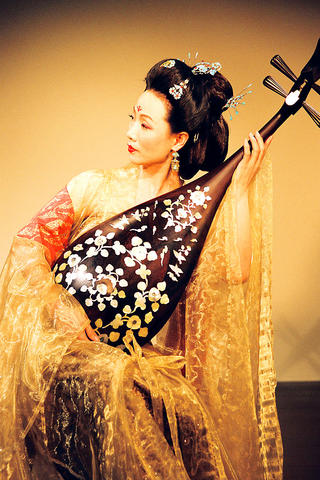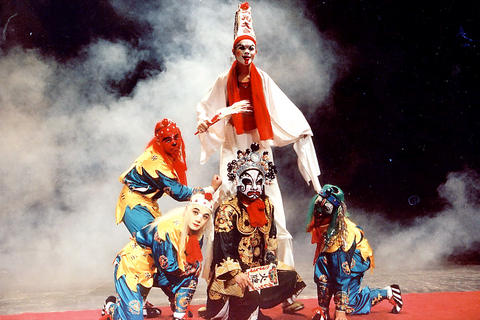It was only last month that the National Theater hosted a massive operatic retelling of the love story between the Tang Dynasty Xuanzong emperor (712-756) and his concubine, Lady Yang, in Firmiana Rain. It was an effort to bring the tale of eternal love and betrayal into the 21st century. This weekend, Rainbow Skirt and Feather Robe (霓裳羽衣), a very different rendition of the story, will take the stage at the Novel Hall (新舞台). The story is set in the historical context of the Tang Dynasty (618-907), with ancient music, language and costumes.
The Xinxin Nanguan Ensemble (心心南管樂坊) specializes in nanguan (南管) music, a genre that can be traced back to the Tang Dynasty and continues to be performed in China's Fujian Province and countries in southeast Asia like Taiwan, Singapore and the Philippines that have old Fujianese immigrant populations. In recent years, nanguan has experienced something of a resurgence in Taiwan, due in no small measure to the work of the Han Tang Yuefu Ensemble (漢唐樂府), which combines nanguan music with the dramatic action of liyuan opera (梨園戲), modern staging and sumptuous costumes to create a spectacle that has brought new audiences to the ancient art.
In an interview with the Taipei Times, Wang Xinxin (王心心), who heads up the Xinxin Nanguan Ensemble, said Rainbow Shirt and Feather Robe takes Han Tang Yuefu's achievements one step further, giving the performance a dramatic structure and greater emotional range.

PHOTO: COURTESY OF XINXIN NANGUAN ENSEMBLE
"We explore ways of bringing out the characters' emotions through the music," Wang said. "Traditionally, the emphasis of nanguan was simply on musicality, and the songs would be sung without specific reference to character."
For the libretto, Wang has drawn directly on the poetry of Hong Sheng (洪昇), who wrote one of the great operatic versions of the love story during the Qing Dynasty titled The Hall of Longevity (長生殿). This takes a small section of the opera - four scenes out of a total of 50 - that focus on the musical collaboration between the emperor and Lady Yang in recreating a piece of music that had been inspired by a dream. This collaboration established the foundation of understanding and admiration that was the basis of their love.
Following Rainbow Skirt and Feather Robe, Xinxin Nanguan Ensemble will present a two-day performance of Mulien Saves His Mother (目蓮救母) by the Quanzhou Dacheng Opera Troupe (泉州打城戲劇團). This story, one of the most venerable pieces in the current Chinese operatic canon, traces its roots to religious plays performed by Buddhist monks and Daoist priests, and, as the title suggests, is heavily moralistic and promotes filial piety and self-sacrifice.

PHOTO: COURTESY OF XINXIN NANGUAN ENSEMBLE
"It is not often performed these days, since it's largely associated with magnificent funeral services of ancient times," said Chia Hsin-yuan (賈馨園), manager of the Xinxin Nanguan Ensemble. "Traditionally, the performance would run for seven days."
In this weekend's performance, which takes the form of dacheng opera (打城戲), the seven days have been condensed into two. "I decided to bring the group over because I was so moved to see that such traditional performances were still practiced," Jia said, speaking of a recent visit to Quanzhou.
Dacheng opera is a mix of storytelling, martial arts, operatic poses and circus acts performed by itinerant religious groups telling moral tales.
As opposed to Rainbow Skirt and Feather Robe, which has been lovingly crafted as a new and original work of historical reconstruction, Mulien Saves His Mother is a piece of cultural anthropology and a unique chance to take a glimpse at the roots of Chinese theater.
"It can be a little bit rough around the edges, but it has such vitality," Jia said. "The performers are used to outdoor stages, and I was worried that putting them on a fine stage might make the piece simply seem very rough and unfinished. But the show is such a unique opportunity, we decided to go ahead anyway."

US President Donald Trump may have hoped for an impromptu talk with his old friend Kim Jong-un during a recent trip to Asia, but analysts say the increasingly emboldened North Korean despot had few good reasons to join the photo-op. Trump sent repeated overtures to Kim during his barnstorming tour of Asia, saying he was “100 percent” open to a meeting and even bucking decades of US policy by conceding that North Korea was “sort of a nuclear power.” But Pyongyang kept mum on the invitation, instead firing off missiles and sending its foreign minister to Russia and Belarus, with whom it

When Taiwan was battered by storms this summer, the only crumb of comfort I could take was knowing that some advice I’d drafted several weeks earlier had been correct. Regarding the Southern Cross-Island Highway (南橫公路), a spectacular high-elevation route connecting Taiwan’s southwest with the country’s southeast, I’d written: “The precarious existence of this road cannot be overstated; those hoping to drive or ride all the way across should have a backup plan.” As this article was going to press, the middle section of the highway, between Meishankou (梅山口) in Kaohsiung and Siangyang (向陽) in Taitung County, was still closed to outsiders

Many people noticed the flood of pro-China propaganda across a number of venues in recent weeks that looks like a coordinated assault on US Taiwan policy. It does look like an effort intended to influence the US before the meeting between US President Donald Trump and Chinese dictator Xi Jinping (習近平) over the weekend. Jennifer Kavanagh’s piece in the New York Times in September appears to be the opening strike of the current campaign. She followed up last week in the Lowy Interpreter, blaming the US for causing the PRC to escalate in the Philippines and Taiwan, saying that as

The Chinese Communist Party (CCP) has a dystopian, radical and dangerous conception of itself. Few are aware of this very fundamental difference between how they view power and how the rest of the world does. Even those of us who have lived in China sometimes fall back into the trap of viewing it through the lens of the power relationships common throughout the rest of the world, instead of understanding the CCP as it conceives of itself. Broadly speaking, the concepts of the people, race, culture, civilization, nation, government and religion are separate, though often overlapping and intertwined. A government